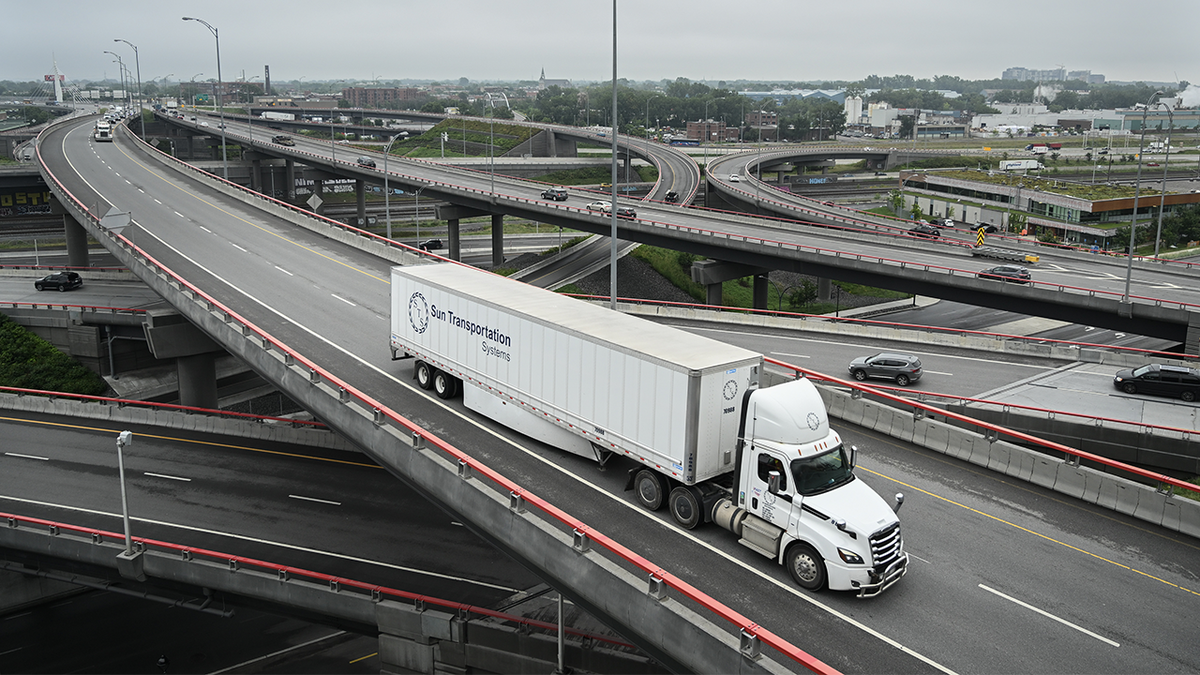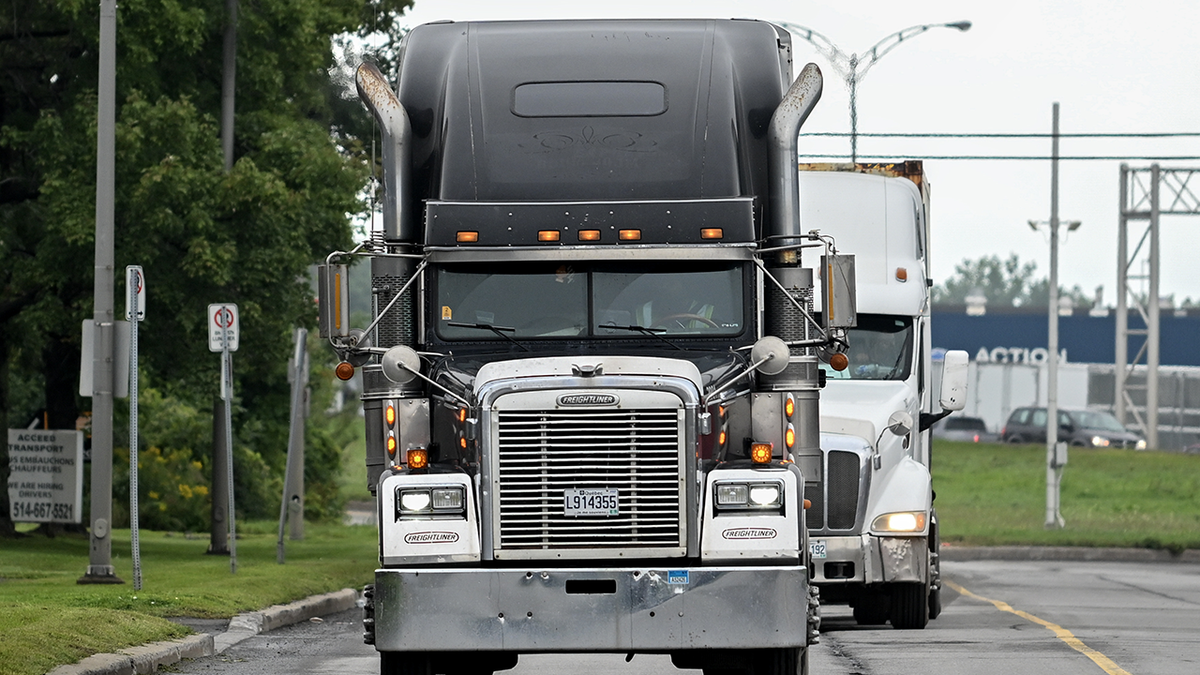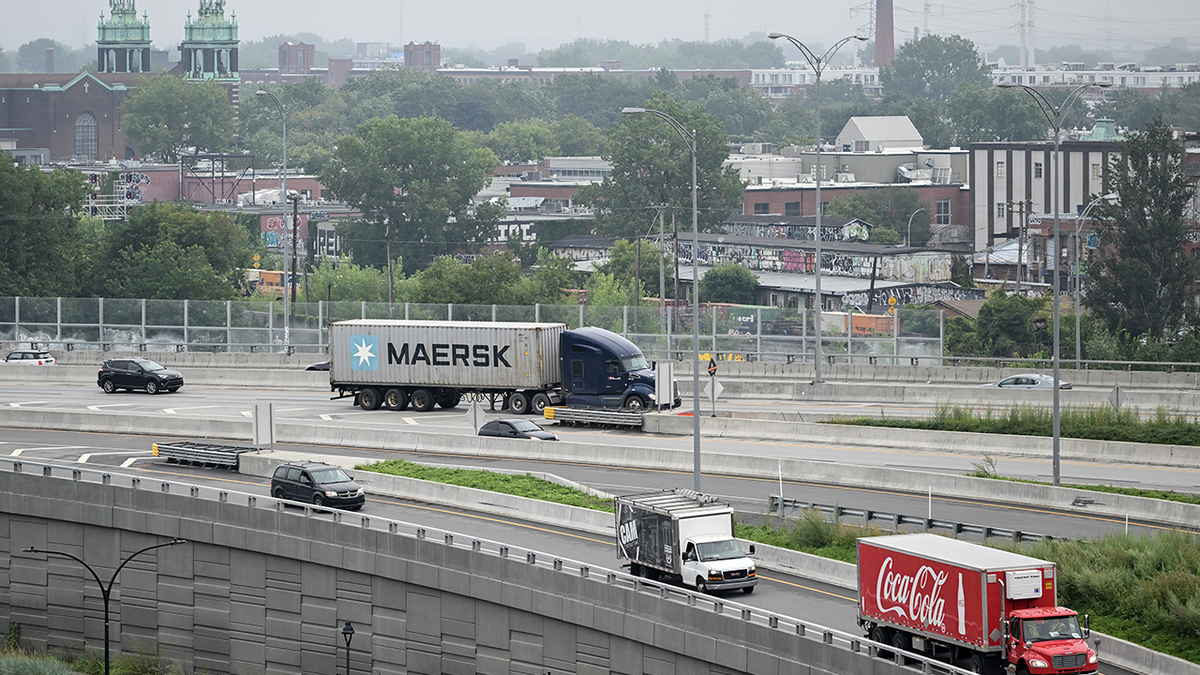Trucking executive argues emission standards put forth by the EPA will crush the supply chain
JKC Trucking Vice-President Mike Kucharski believes the Biden administration is promoting green energy at the expense of the U.S.'s food supply.
President Joe Biden's administration finalized plans for a program it argues will further reduce air pollution from heavy-duty engines and vehicles across the United States, but truckers argue the proposed standards will crush the supply chain and put the American food supply at risk.
The new emission standards put forth by the Environmental Protection Agency (EPA) "are significantly more stringent," "cover a wider range of heavy-duty engine operating conditions" compared to previous standards and are aimed at reducing emissions of nitrogen oxides and other pollutants. The rule officially went into effect on March 27 of this year, but will be implemented for new trucks sold after 2027.
Despite the positive spin by the current administration, truckers say the agency's standards will promote green energy at the expense of the economy and the country's food supply. More than 95% of the trucking companies that make up the industry are small businesses operating about ten or fewer trucks, JKC Trucking Vice-President and Co-Owner Mike Kucharski told Fox News Digital.
He believes that by complying with the EPA's clean energy mandates, many small trucking companies will be pushed out of the business, tightening trucking capacity nationwide and causing severe price inflation "worse than we have right now," which will be passed down to consumers.
JKC Trucking Inc. is Chicago's largest specialty contract carrier for climate controlled and dry freight loads specializing in less than truckload (LTL) shipments for customers with one box, one pallet or half a truck to ship from the Midwest to California, Florida and major cities west of the Mississippi River.

Truckers believe the Biden administration EPA rules will promote electric vehicles at the expense of their whole industry. (Graham Hughes/Bloomberg via Getty Images)
The EPA estimates the technology required to meet the new rule’s standards will cost between $2,568 and $8,304 per vehicle, but the American Truck Dealers Association (ATDA) estimates it is more likely a $42,000 increase per truck. In total, the ATDA projects the associated costs of this new regulation on the country could reach $55 billion over the lifetime of the program.
"A new clean diesel long haul tractor typically costs in the range of $180,000 to $200,000," Kucharski said. "A comparable battery electric tractor costs upwards of $480,000, that's about a $300,000 upcharge, [which] is cost prohibitive for the overwhelming majority of motor carriers."
"This mandate is based on brand-new technology, number one, and they're supporting green energy" above the economy, he added. "I support green energy, but it's extremely frustrating because it's this new mandate that they are forcing... truckers are nonstop overregulated."
Todd Spencer, president at the Owner-Operator Independent Drivers Association (OOIDA), told Fox News Digital that the EPA's regulations are part of their "regulatory blitz on small-business truckers."
"This newest announcement is a blatant attempt to force consumers into purchasing electric vehicles while a national charging infrastructure network remains absent for heavy-duty commercial trucks," he said. "Professional drivers are skeptical of electric vehicle costs, mileage range, battery weight and safety, charging time and availability."
"It’s baffling that the EPA is pushing forward with more impractical emissions timelines without first addressing these overwhelming concerns with electric commercial motor vehicles," he added. "The pursuit of this radical environmental agenda in conjunction with an anticipated speed limiter mandate will regulate the safest and most experienced truckers off the road."
Republican U.S. Senator Deb Fischer of Nebraska proposed a resolution that would have blocked the EPA mandate. It passed the Senate in April and the House in May, but Biden used his veto power to kill the resolution shortly thereafter.
In July, a bipartisan group in Congress sent a letter to the EPA expressing similar concerns about the regulations.
"The EPA's always pushing more and more regulations on us, and it's harder to do our job now," Kucharski said. "We're kind of sick of it, the administration and EPA jamming it down the truckers' throats."
"These regulations are not practical," he said. "Number one, costs, two, infrastructure - we're not ready for the infrastructure. Three, the testing and data - they're just doing the testing on these trucks right now. I really haven't even driven an electric truck or seen one in person."
Kucharski said the driving range of electric trucks is nowhere close to gas and diesel powered vehicles and is simply "not practical" right now.
"The charge of an electric truck is about 10 hours and the distance could be about 150 miles to 300 miles," Kucharski said. "To give you an idea right now, one of our diesel trucks, when it fills out 300 gallons, it has a capacity to go 1,600 to 1,800 miles."
"So these 300 miles, let's say you and I jump in a truck tomorrow, we have to go to Los Angeles from Chicago, we're barely out of the state of Illinois, let alone able get food to the West Coast or come back," he added. "It's just going to take the transit time and increase it. With new technology, the distance should be as much as we have now, if not even further."

Because lithium batteries used to power trucks weigh around 8,000 pounds, truckers will have to forego four tons of goods on every electric vehicle. (Graham Hughes/Bloomberg via Getty Images)
In addition, he explained that the lithium batteries weigh around 8,000 pounds, which means there will be 8,000 pounds less in payload on each electric truck to make room for the 4-ton battery.
"We will have to take less payload because of these new lithium batteries that weigh about 8,000 pounds, so that is about 300 gallons of diesel [or] about 2,100 pounds of fuel and every gallon we burn we're lighter about around 7 pounds, but with these lithium batteries, fully charged or not, we're still at 8,000 pounds," he explained.
In June, 20 states sued the EPA for granting California a waiver to issue its own set of truck emissions standards that go further than the federal regulations, effectively banning the sale of gas or diesel trucks, according to Iowa Attorney General Brenna Bird. Under California's truck ban, about 55% of delivery vans and small trucks, 75% of buses and larger trucks and 40% of tractor-trailers must be fully electric by 2035. By 2045, gas and diesel trucks will be banned from being sold in California.
The attorneys general from across the country argue the California rule will impact the whole country and the entire trucking industry. In lockstep with California, eight other states - Colorado, Massachusetts, Maryland, New Jersey, New York, Oregon, Vermont and Washington - have adopted the state's rule and Connecticut, Maine and North Carolina plan to follow, according to Bird.
"The last two summers in California have been the hottest summers on record," Kucharski said. "It was really funny because last summer the regulation came out about California electrifying trucks and the next day, the news people were going on the news saying, ‘Do not plug in your electric cars, the grid is overwhelmed,’ mentioning that the day before, California passed legislation to electrify all these trucks. We're not ready for that, especially California."
Because 70% of all goods are trucked in America, Kucharski said there is an entrenched system that can't be revamped overnight should the trucking industry go under.
"We have such a developed transportation supply chain that this would just decapitate the supply chain if we stopped," he said. "How will these trucks work in the extreme cold? Because the way to kill a lithium battery or any battery is extreme cold and extreme heat. How will it work in high elevations? How's it going to work in the Las Vegas deserts when it is 130 degrees?"
He criticized the administration for moving full steam ahead with regulations that didn't take into account the truckers, the supply chain or the American people.
"My concern is that if this technology fails, the entire supply chain will be dead in the water," he added. "Failure is not merely inconvenient, it's catastrophic. This is not an option, especially for the food supply chain of America."

Kucharski warns the supply chain would be "dead in the water" if the trucking industry ground to a halt. (Graham Hughes/Bloomberg via Getty Images)
"Time is money in the trucking industry and this is all trickle down to the end user, the American people," Kucharski warned.
While the supply chain does have a safety stock, Kucharski said the rule has always been that the less stock, the more profit is made, so the food supply stock is super thin. If all trucking stopped in America, stores would start running out of food within 48 to 72 hours, so there should be back-up parameters in place to keep truckers up and running, he argued.
HOUSE VOTES TO END BIDEN'S CRACKDOWN ON GAS-POWERED TRUCKS; FOUR DEMS JOIN GOP
Kucharski said the government needs to learn from the fallout of the COVID-19 pandemic because truckers are the backbone of the American supply chain.
"So we don't get into this same situation, we have to learn from our mistakes, learn from COVID," he said. "I say we need to sit down with the lawmaker, lawmakers need to sit down with us, so we can show them our problems, so we can come up with solutions together to keep the wheels rolling and feeding the American people."
The EPA explained its stance in a statement to Fox News Digital.
"EPA recognizes that feasibility for smaller trucking companies is critically important for the success in the increasing development and adoption of electric vehicles. EPA has considered in our analysis the significant investments in electric vehicles by the industry as well as the historic financial incentives under the Bipartisan Infrastructure Law and the Inflation Reduction Act. The Inflation Reduction Act specifically includes a number of cost-reducing measures for zero-emission vehicles that vehicle manufactures and truck buyers can take advantage of, including tax credits for the production and sale of battery cells and modules of up to $45 per kilowatt-hour and a vehicle tax credit of up to $40,000 for heavy-duty electric vehicles," a spokesperson said.
"In April, EPA announced new proposed federal vehicle emissions standards that will accelerate the ongoing transition to a clean vehicles future and tackle the climate crisis. The proposed standards would improve air quality for communities across the nation, especially communities that have borne the burden of polluted air. Under the proposed performance-based standards for heavy-duty vehicles we considered future infrastructure needs and costs, and the magnitude of our standards reflects our analysis of the feasibility (factoring in costs) with future growth of electric vehicle technology in the timeframe of the rule. We have proposed to exempt small business vehicle manufacturers from the proposed standards. Also, under the proposed standards, we estimate the typical buyer of a zero-emission heavy-duty vehicle would recoup any increased upfront costs over the lifetime of the vehicle through the operational savings, with estimated average payback periods of between one and three years for vocational vehicles, three years for day cab tractors, and seven years for sleeper cab tractors for model year 2032 vehicles."
CLICK HERE TO GET THE FOX NEWS APP
This article was updated with a response from the EPA.
For more Culture, Media, Education, Opinion, and channel coverage, visit foxnews.com/media










































